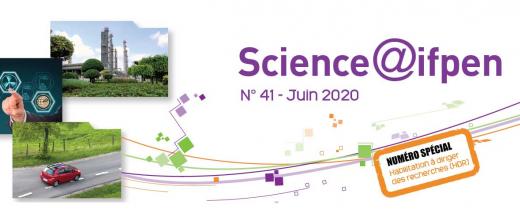
News in brief
Prediction of fluid oxidation stability via machine learning
IFPEN uses numerous fluids in its fields of innovation for a variety of applications, ranging from renewable energy production to sustainable mobility. Many of the fluids are complex mixtures and the chemistry of their components (hydrocarbons, alcohols, esters, etc.) varies depending on the target application: combustion, cooling, lubrication, electrical insulation, etc.
Individual page
Christophe PREUX
Head of Department, Physico Chemistry of Complex Fluids and Materials
Christophe Preux graduated from the MATMECA engineering school (+ DEA in applied mathematics) (2003) before completing his doctoral thesis at the University of Bordeaux 1 in partnership with the CEA

News in brief
Colloid transport in porous media: deposits and plugging
The transport of colloidal particles in porous media is relevant to a number of fields, including geosciences and environmental engineering. Particle-matrix interactions can lead to deposit formation and accumulation, potentially damaging the medium and altering its permeability. (...) At IFPEN, the problem was originally studied for oil and gas production, but research has now been extended to include the fields of geothermal energy and geological storage of CO2.

News in brief
Flair Suite™: supporting environmental and industrial gas monitoring
Today, air quality is an issue of major concern when it comes to public health. To protect it, it is necessary to reduce emissions but also monitor global chemical changes taking place in the atmosphere. From the economic and safety points of view, it is also important to monitor industrial gas emissions. It was to tackle these different aspects that IFPEN’s researchers began developing a range of technological solutions, within the context of the Flair Suite™ project.

Individual page
Thomas LEROY
Project Manager Electrochimical Systems and Energy Management
Thomas Leroy is graduated from ESSTIN and received the PhD degree in Control theory and Mathematics from the Ecole des Mines ParisTech, France, in 2010. He joined IFPEN as control research engineer on

Individual page
Pierre MICHEL
Mobility modeling and analysis research engineer
Pierre Michel obtained in 2015 a PhD from Université d’Orléans for his thesis work on Hybrid Electric Vehicle energy management. After a post-doc at Argonne National Laboratory on Connected and

News in brief
A new numerical tool to simulate the interaction between wind farms and local meteorological conditions
The French long-term energy program is encouraging the growth of wind energy. In order to predict this energy production and attempt to optimize it, irrespective of the production site (sea, mountain), a better understanding of wind flow...

News in brief
The detection, at a lower cost, of ultrafine exhaust gas soot particles
To protect public health, fine particle emissions produced by IC engines have been regulated by the European Union since the 1990s. In order to comply with these standards, particle filters...

News in brief
Multiphase reactive flow simulation: developments and applications in the field of combustion (HDR 2015)
The scientific field concerned by my HDR research is the 3D numerical modeling of two-phase combustion, combining research on turbulent combustion and the preparation of the reactive mixture. Building
Individual page
Antonio SCIARRETTA
Dr. Antonio Sciarretta (HDR, ASN) is a researcher at IFPEN since 2006.
Antonio Sciarretta received a Doctorate degree in thermal machines with a dissertation on engine modeling and control in 1999, and since then he has always worked at the intersection of these fields


